A crucial part of guaranteeing justice and equity is the writ of certiorari, a prerogative recourse under the virtue of Article 226 of COI. The High Courts may examine and overturn rulings made by lower courts, tribunals, or quasi-judicial organizations using this remedy. The Supreme Court has established guidelines for issuing writs of certiorari over the years, providing a thorough framework for the use of this unusual authority.
Need A Legal Advice
The internet is not a lawyer and neither are you. Talk to a real lawyer about your legal issue

Writ of Certiorari: History
The writ has its roots in English common law and was adopted into the Indian legal system as a safeguard against arbitrary and capricious administrative actions. Article 226 of the Constitution confers the power to issue writs, including certiorari, to High Courts for the enforcement of fundamental rights and for any other purpose.
Writ of Certiorari: Its Nature
The writ of certiorari is an extraordinary remedy, and its issuance is discretionary. The Supreme Court has consistently emphasized that the power to issue this writ should be exercised cautiously and sparingly. It is not an appellate jurisdiction but rather a supervisory jurisdiction to ensure that the inferior courts and tribunals act within their jurisdiction and adhere to the principles of natural justice.
Issuing Writ of Certiorari: Grounds
- One of the primary grounds for the issuance of a writ of certiorari is the commission of an error of jurisdiction. If a lower court or tribunal acts beyond its statutory or constitutional authority, the High Court may intervene to correct the error. The Supreme Court has clarified that an error apparent on the face of the record, which goes to the root of jurisdiction, is a valid ground for invoking certiorari.
- A violation of the principles of natural justice is another crucial ground for the issuance of the writ. If a decision is reached without affording a party the opportunity to be heard or if the audi alteram partem rule is breached, the High Court may exercise its jurisdiction to quash the decision. The Supreme Court has emphasized that natural justice is a cornerstone of fair administrative action, and any deviation warrants judicial intervention.
- While the High Court is cautious about interfering with findings of fact, it may intervene if there is a manifest error of law apparent on the face of the record. The Supreme Court has clarified that the error must be such that it goes to the root of the matter and results in a miscarriage of justice. Mere errors in the interpretation of evidence or appreciation of facts may not be sufficient grounds for the issuance of certiorari.
Discretionary Nature and Alternative Remedies
- The Supreme Court has consistently reiterated that the issuance of a writ of certiorari is a matter of discretion for the High Court. The existence of an alternative remedy does not oust the jurisdiction of the High Court to issue the writ, but the court may consider the availability of alternative remedies as a relevant factor in exercising its discretion.
- The court may refuse to entertain a petition for certiorari if it deems that the petitioner has an adequate alternative remedy.
Aggrieved Party Must Approach the Court Promptly
- Another important principle emphasized by the Supreme Court is that the aggrieved party must approach the court promptly. Delay in seeking the writ may be a valid ground for refusing the remedy.
- The court may take into account the concept of laches and refuse to entertain a petition if there is an unreasonable delay in approaching the court.
Substantive Ultra Vires and Procedural Ultra Vires
- The concept of ultra vires, meaning beyond one’s legal power or authority, is vital in the context of certiorari. The Supreme Court has recognized both substantive ultra vires and procedural ultra vires as grounds for the issuance of the writ.
- Substantive ultra vires relates to acts or decisions that go beyond the powers conferred by law, while procedural ultra vires pertains to breaches of procedural requirements, such as a disregard for the natural justice principles.
Article 226 of COI provides a strong remedy for a writ of certiorari, which can be used to address jurisdictional errors, natural justice violations, and clear legal errors made by subordinate courts, tribunals, or quasi-judicial bodies. Through its jurisprudence, the Supreme Court has clearly defined the parameters that govern the issuance of this exceptional writ, highlighting the remedy’s discretionary nature, the significance of grounds like the error of jurisdiction and natural justice violation, and the necessity of swift redress.
One can talk to a lawyer from Lead India for any kind of legal support. In India, free legal advice online can be obtained at Lead India. Along with receiving free legal advice online, one can also ask questions to the experts online free through Lead India.





 Talk to a Lawyer
Talk to a Lawyer